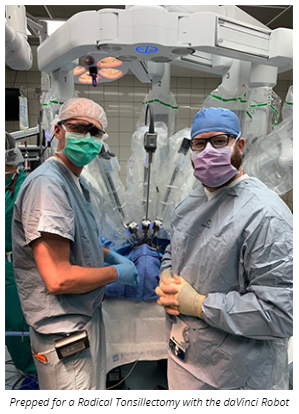Checking out the Area of Otolaryngology: What to Expect When You Speak With an ENT
Otolaryngology, commonly described as ENT, incorporates the medical diagnosis and therapy of nose, ear, and throat disorders. For those experiencing related concerns, speaking with an ENT professional can offer clarity and alleviation. Comprehending what to expect during such examinations is essential for efficient communication and treatment. This review will lay out vital elements of the ENT experience, including typical factors for visits and the procedures involved in medical diagnosis and therapy.

Comprehending Otolaryngology: An Introduction
Otolaryngology, often described as ENT (Throat, nose, and ear) medication, is a customized branch of medication that concentrates on the medical diagnosis and therapy of conditions affecting these crucial locations of the human body. This area encompasses a vast range of disorders, including those pertaining to hearing, equilibrium, respiratory function, and speech. Otolaryngologists are educated to handle both surgical and clinical treatments, making use of sophisticated methods and innovations. Their know-how expands past standard disorders, dealing with problems such as allergies, sinus infections, and hearing loss. In addition, they play a vital duty in the monitoring of head and neck cancers cells, supplying thorough treatment customized to individual person needs. Overall, otolaryngology remains crucial for preserving health and wellness and lifestyle in affected individuals.
Common Factors to See an ENT Expert
Many individuals look for the knowledge of an ENT specialist for a variety of reasons, reflecting the varied nature of conditions that influence the nose, ear, and throat. Common issues include persistent sinusitis, which typically brings about consistent nasal blockage and facial pain. Allergic reactions and their linked signs and symptoms, such as itching and sneezing, additionally trigger check outs to these professionals (Hearing). Hearing loss, whether sudden or steady, is another significant reason for examination. Furthermore, people might seek assessment for throat disorders, including persistent hoarseness or ingesting difficulties. Sleep apnea, defined by interrupted breathing throughout sleep, is frequently resolved by ENT experts. Each of these problems highlights the importance of specialized treatment in taking care of complicated ENT-related health problems
Getting ready for Your ENT Visit
When preparing for an ENT visit, it is vital to gather appropriate details and consider any type of certain worries. Individuals must put together a thorough clinical history, consisting of previous ear, nose, or throat issues, surgical procedures, and existing medications. Recording signs and symptoms-- such as severity, regularity, and period-- can provide useful insights for the ENT expert. Additionally, individuals need to prepare a list of inquiries they wish to ask, ensuring that all worries are dealt with throughout the see. Bringing along any type of relevant medical records or test results can better assist the ENT in comprehending the person's condition. Individuals ought to validate their consultation details, consisting of time, date, and place, to decrease any final confusion. Appropriate preparation can boost the efficiency of the assessment and bring about better end results.
What to Anticipate During the Appointment
As the appointment begins, the individual can expect to take part in a detailed discussion with the ENT expert about their symptoms and medical history. The specialist will certainly ask about the duration, regularity, and extent of signs and symptoms such as hearing loss, nasal blockage, or sore throat. Additionally, the person's previous clinical problems, medicines, and any type of appropriate family members history will be examined, helping the expert in creating a total understanding of the patient's health and wellness. The ENT may likewise inquire about lifestyle factors, such as direct exposure to allergens or toxic irritants. This open discussion establishes a structure for the assessment, making sure that the patient's issues are attended to and setting the phase for any required analyses or check here referrals for therapy.
Diagnostic Examinations and Treatments in Otolaryngology
A series of diagnostic tests and treatments are essential in otolaryngology to precisely evaluate and identify problems affecting the nose, ear, and throat. Usual tests consist of audiometry, which measures hearing feature, and tympanometry, evaluating middle ear pressure. Nasal endoscopy permits visualization of the nasal flows and sinuses, while laryngoscopy takes a look at the throat and vocal cables. Imaging methods, such as CT scans and MRIs, give in-depth sights of head and neck frameworks. Allergic reaction screening might also be performed to determine triggers for sinus or respiratory problems. These analysis tools allow ENT experts to establish a thorough understanding of people' problems, making certain tailored and reliable monitoring strategies. Correct medical diagnosis is crucial for effective therapy results in otolaryngology.
Therapy Choices Supplied by ENT Specialists
ENT specialists supply a selection of treatment options customized to deal with details problems impacting the nose, throat, and ear. These therapies range from traditional techniques, such as medicine and way of living adjustments, to more invasive procedures. Allergies might be managed with antihistamines or immunotherapy, while persistent sinus problems may need nasal corticosteroids or sinus surgical treatment. For hearing loss, ENT professionals frequently recommend hearing help or surgical interventions like cochlear implants. In instances of throat disorders, options can include speech treatment or operations to eliminate blockages. Additionally, they might give assistance for managing sleep apnea, including the use of CPAP devices or surgical interventions. Overall, the objective is to enhance people' lifestyle with individualized care and efficient therapy strategies.
When to Look For Follow-Up Care With an ENT
Acknowledging when to seek follow-up treatment with an ENT expert is essential for handling continuous signs or difficulties associated with throat, nose, and ear conditions. Patients should take into consideration scheduling a follow-up appointment if signs and symptoms continue in spite of initial treatment, such as persistent ear discomfort, nasal blockage, or throat discomfort. Modifications in hearing, balance concerns, or uncommon nasal discharge might also necessitate additional evaluation. Additionally, if an individual experiences side results from recommended medicines or has web link undergone an operation, follow-up treatment is essential to keep an eye on recuperation and resolve any kind of concerns. Timely examinations can ensure efficient monitoring of problems, protect against potential problems, and supply comfort concerning one's wellness. Looking for follow-up care advertises positive wellness management in otolaryngology.
Regularly Asked Concerns

What Certifications Should I Search for in an ENT Specialist?
When seeking an ENT professional, one ought to try to find board certification, appropriate experience, and strong patient reviews. Additionally, reliable communication skills and a compassionate approach can significantly enhance the total therapy experience.
How Do I Pick the Right ENT for My Needs?
Selecting the best ENT expert entails assessing their qualifications, experience, and individual evaluations (Otolaryngologist). It is necessary to contemplate their communication design and method to therapy, guaranteeing they line up with the person's details health demands and choices
Exist Any Type Of Dangers Related To ENT Procedures?
The dangers linked with ENT treatments might consist of infection, bleeding, anesthetic problems, and potential damage to surrounding structures. Clients ought to discuss these threats with their physician to recognize specific worries and guarantee informed choices.
How Can I Handle Stress And Anxiety Before My ENT Appointment?
To handle stress and anxiety prior to a consultation, individuals can exercise deep breathing workouts, envision positive end results, prepare inquiries ahead of time, and seek support from friends or household, promoting a feeling of peace of mind and peace.
What Should I Do if I Experience Adverse Effects From Therapy?
If negative effects from treatment take place, the person ought to quickly report them to their doctor. Modifications to treatment or additional interventions may be required to guarantee safety and security and efficiency in managing their problem - ENT Doctor. As the consultation starts, the patient can expect to involve in an extensive conversation with the ENT specialist concerning their signs and symptoms and clinical background. These analysis tools allow ENT professionals to develop a thorough understanding of people' conditions, making i thought about this certain tailored and reliable administration plans. ENT experts offer a variety of treatment alternatives tailored to attend to specific problems influencing the ear, nose, and throat. When seeking an ENT professional, one need to look for board certification, appropriate experience, and strong person evaluations. Selecting the best ENT professional includes evaluating their credentials, experience, and patient evaluations